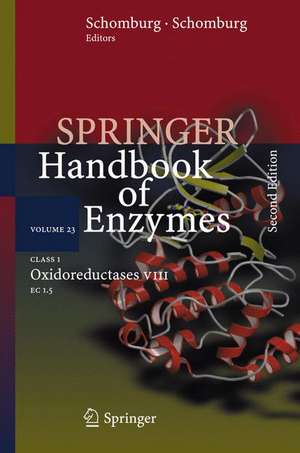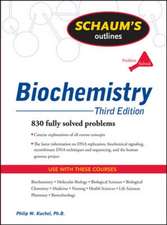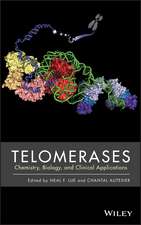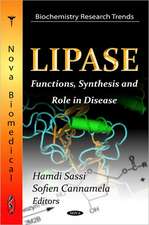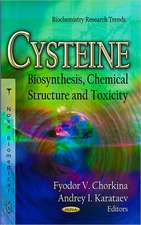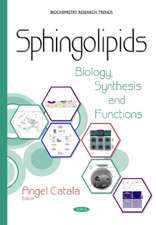Class 1 Oxidoreductases VIII: EC 1.5: Springer Handbook of Enzymes, cartea 23
Antje Chang Editat de Dietmar Schomburg, Ida Schomburgen Limba Engleză Hardback – 19 apr 2005
This new, second edition reflects considerable progress in enzymology: many enzymes are newly classified or reclassified. Each entry is correlated with references and one or more source organisms. New datafields are created: application and engineering (for the properties of enzymes where the sequence has been changed). The total amount of material contained in the Handbook has more than doubled so that the complete second edition consists of 39 volumes as well as a Synonym Index. In addition, starting in 2009, all newly classified enzymes are treated in Supplement Volumes.
Springer Handbook of Enzymes is an ideal source of information for researchers in biochemistry, biotechnology, organic and analytical chemistry, and food sciences, as well as for medicinal applications.
Din seria Springer Handbook of Enzymes
-
 Preț: 321.83 lei
Preț: 321.83 lei - 24%
 Preț: 1611.36 lei
Preț: 1611.36 lei - 18%
 Preț: 1843.73 lei
Preț: 1843.73 lei - 24%
 Preț: 1573.72 lei
Preț: 1573.72 lei - 18%
 Preț: 2111.59 lei
Preț: 2111.59 lei - 18%
 Preț: 1838.38 lei
Preț: 1838.38 lei - 18%
 Preț: 1849.41 lei
Preț: 1849.41 lei - 18%
 Preț: 1851.62 lei
Preț: 1851.62 lei - 18%
 Preț: 1833.16 lei
Preț: 1833.16 lei - 18%
 Preț: 1833.33 lei
Preț: 1833.33 lei - 18%
 Preț: 1833.48 lei
Preț: 1833.48 lei - 18%
 Preț: 1829.36 lei
Preț: 1829.36 lei - 18%
 Preț: 1838.38 lei
Preț: 1838.38 lei - 18%
 Preț: 1837.75 lei
Preț: 1837.75 lei - 18%
 Preț: 1229.91 lei
Preț: 1229.91 lei - 18%
 Preț: 1244.26 lei
Preț: 1244.26 lei - 18%
 Preț: 1838.38 lei
Preț: 1838.38 lei - 18%
 Preț: 1232.71 lei
Preț: 1232.71 lei - 18%
 Preț: 1834.58 lei
Preț: 1834.58 lei - 18%
 Preț: 1833.95 lei
Preț: 1833.95 lei - 18%
 Preț: 1238.11 lei
Preț: 1238.11 lei - 18%
 Preț: 1236.99 lei
Preț: 1236.99 lei - 18%
 Preț: 1233.52 lei
Preț: 1233.52 lei - 18%
 Preț: 1234.46 lei
Preț: 1234.46 lei - 18%
 Preț: 1832.39 lei
Preț: 1832.39 lei - 18%
 Preț: 1832.39 lei
Preț: 1832.39 lei - 18%
 Preț: 1236.38 lei
Preț: 1236.38 lei - 18%
 Preț: 1233.52 lei
Preț: 1233.52 lei - 18%
 Preț: 1832.39 lei
Preț: 1832.39 lei - 18%
 Preț: 1829.86 lei
Preț: 1829.86 lei - 18%
 Preț: 1828.92 lei
Preț: 1828.92 lei - 18%
 Preț: 1842.94 lei
Preț: 1842.94 lei
Preț: 1828.11 lei
Preț vechi: 2229.40 lei
-18% Nou
Puncte Express: 2742
Preț estimativ în valută:
349.90€ • 360.59$ • 295.40£
349.90€ • 360.59$ • 295.40£
Carte tipărită la comandă
Livrare economică 03-17 martie
Preluare comenzi: 021 569.72.76
Specificații
ISBN-13: 9783540238539
ISBN-10: 3540238530
Pagini: 450
Ilustrații: XXII, 401 p.
Dimensiuni: 155 x 235 x 29 mm
Greutate: 0.77 kg
Ediția:2nd ed. 2005
Editura: Springer Berlin, Heidelberg
Colecția Springer
Seria Springer Handbook of Enzymes
Locul publicării:Berlin, Heidelberg, Germany
ISBN-10: 3540238530
Pagini: 450
Ilustrații: XXII, 401 p.
Dimensiuni: 155 x 235 x 29 mm
Greutate: 0.77 kg
Ediția:2nd ed. 2005
Editura: Springer Berlin, Heidelberg
Colecția Springer
Seria Springer Handbook of Enzymes
Locul publicării:Berlin, Heidelberg, Germany
Public țintă
ResearchCuprins
Pyrroline-2-carboxylate reductase.- Pyrroline-5-carboxylate reductase.- Dihydrofolate reductase.- Dihydrofolate dehydrogenase.- Methylenetetrahydrofolate dehydrogenas (NADP+).- Formyltetrahydrofolate dehydrogenase.- Saccharopine dehydrogenase (NAD+, l-lysine-forming).- Saccharopine dehydrogenase (NADP+, l-lysine-forming).- Saccharopine dehydrogenase (NAD+, l-glutamate-forming).- Saccharopine dehydrogenase (NADP+, l-glutamate-forming).- d-Octopine dehydrogenase.- 1-Pyrroline-5-carboxylate dehydrogenase.- Nicotinate dehydrogenase.- 1,2-Didehydropipecolate reductase.- Methylenetetrahydrofolate dehydrogenase (NAD+).- d-Lysopine dehydrogenase.- Alanopine dehydrogenase.- Ephedrine dehydrogenase.- d-Nopaline dehydrogenase.- Methylenetetrahydrofolate reductase (NADPH).- ?1Piperideine-2-carboxylate reductase.- Strombine dehydrogenase.- Tauropine dehydrogenase.- N5-(Carboxyethyl)ornithine synthase.- Thiomorpholine-carboxylate dehydrogenase.- ?-Alanopine dehydrogenase.- 1,2-Dehydroreticulinium reductase (NADPH).- Opine dehydrogenase.- FMN Redctase.- Flavin reductase.- Berberine reductase.- Vomilenine reductase.- Pteridine reductase.- 6,7-Dihydropteridine reductase.- Sarcosine oxidase.- N-Methyl-l-amino-acid oxidase.- Spermine oxidase.- N6-Methyl-lysine oxidase.- (S)-6-Hydroxynicotine oxidase.- (R)-6-Hydroxynicotine oxidase.- l-Pipecolate oxidase.- (S)-Tetrahydroprotoberberine oxidase.- Reticuline oxidase.- Dimethylglycine oxidase.- Polyamine oxidase.- Dihydrobenzophenanthridine oxidase.- Pyrimidodiazepine synthase.- Electron-transferring-flavoprotein dehydrogenase.- Dimethylamine dehydrogenase.- Trimethylamine dehydrogenase.- Sarcosine dehydrogenase.- Dimethylglycine dehydrogenase.- l-Pipecolate dehydrogenase.- Nicotine dehydrogenase.- Methylglutamate dehydrogenase.- Spermidinedehydrogenase.- Trimethylamine dehydrogenase.- Proline dehydrogenase.- Methylenetetrahydromethanopterin dehydrogenase.- Dimethylamine dehydrogenase.- Coenzyme F420-dependent N5,N10-methenyltetrahydromethanopterin reductase.- Cytokinin dehydrogenase.
Recenzii
ChemBioChem 3/2002: Comparing Volume 2 of the first edition with Volume 1 of the second edition one rapidly notices that an incredible amount of work was spent on updating the different datafields.
The handbook is definitely worth buying, since it is probably the best reference manual available to date and is, therefore, an improtant acquisition for libraries. (W. Kroutil, University of Graz)
The handbook is definitely worth buying, since it is probably the best reference manual available to date and is, therefore, an improtant acquisition for libraries. (W. Kroutil, University of Graz)
Textul de pe ultima copertă
Springer Handbook of Enzymes provides data on enzymes sufficiently well characterized. It offers concise and complete descriptions of some 5,000 enzymes and their application areas. Data sheets are arranged in their EC-Number sequence and the volumes themselves are arranged according to enzyme classes.
This new, second edition reflects considerable progress in enzymology: many enzymes are newly classified or reclassified. Each entry is correlated with references and one or more source organisms. New datafields are created: application and engineering (for the properties of enzymes where the sequence has been changed). The total amount of material contained in the Handbook has more than doubled so that the complete second edition consists of 39 volumes as well as a Synonym Index. In addition, starting in 2009, all newly classified enzymes are treated in Supplement Volumes.
Springer Handbook of Enzymes is an ideal source of information for researchers in biochemistry, biotechnology, organic and analytical chemistry, and food sciences, as well as for medicinal applications.
This new, second edition reflects considerable progress in enzymology: many enzymes are newly classified or reclassified. Each entry is correlated with references and one or more source organisms. New datafields are created: application and engineering (for the properties of enzymes where the sequence has been changed). The total amount of material contained in the Handbook has more than doubled so that the complete second edition consists of 39 volumes as well as a Synonym Index. In addition, starting in 2009, all newly classified enzymes are treated in Supplement Volumes.
Springer Handbook of Enzymes is an ideal source of information for researchers in biochemistry, biotechnology, organic and analytical chemistry, and food sciences, as well as for medicinal applications.
Caracteristici
Offers concise and complete description of about 5,000 enzymes sufficiently well characterized as well as their application in analytical, synthetic and biotechnology processes, in food industry, and for medicinal treatments This new, second edition reflects considerable progress in enzymology: many of the enzymes have either been newly classified, or re-classified Content in this new edition has doubled: now consists of 39 volumes as well as a synonym index Starting in 2009 all newly classified enzymes are treated in the Supplement Volumes Available in print as well as online
